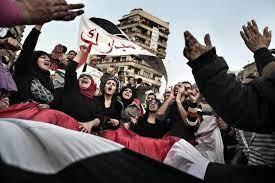Those arrested include journalists, a prominent lawyer, and a member of an opposing political party, activists and others reported. The ongoing repression, which coincides with Egypt hosting the COP27 climate conference, increases fears that once the conference is over, the authorities could retaliate against Egyptian activists and dissidents who criticized the government’s environmental and human rights record.
“From surveillance to intimidation to outright arrests, the behavior of Egyptian authorities while the spotlight is on the country raises alarm bells about what may happen after COP27 is over,” said Lama Fakih, Middle East and North Africa director at Human Rights Watch. “Egypt’s international partners should press Egyptian authorities both publicly and privately to respect the right of its citizens to speak critically about human rights and end the country’s human rights crisis.”
The Egyptian Commission for Rights and Freedoms (ECRF) shared documentation with Human Rights Watch on detentions of nearly 700 people across 18 governorates between October 1 and November 14, 2022. According to ECRF, the authorities appeared to have targeted Egyptians merely for responding to calls for anti-government protests circulating on social media on November 11, which came amid an economic crisis triggered by a dramatic currency devaluation. Based on the ECRF data, the authorities have ordered most of these detainees held for 15 days pending investigation under terrorism-related charges.
The ECRF said that about 40 of those detained have not been brought before prosecution officials, and their whereabouts remain unknown days after their arrests. Under international law, a government violates the prohibition against enforced disappearance when its agents take a person into custody and then either deny the government is detaining the person or fail to disclose the person’s whereabouts. “Disappeared” people are at high risk of torture.
The calls for protests triggered a tight security lockdown across the country, with the authorities postponing several concerts and sporting events that were scheduled for November 11. On November 11, local media noted a heavy security presence in Cairo and Giza to prevent any assemblies.
The authorities have targeted several journalists amid the crackdown. On November 7, local media reported that the authorities detained Mohamed Moussa, a local journalist, taking him from his home, and charged him in relation to the protests call. On November 10, local media reported that Egyptian authorities detained Ahmed Fayez, a local journalist who had hinted on Facebook that the detained hunger striking political activist Alaa Abdelfattah, whose case received attention at COP27, was being force-fed by prison authorities.
The crackdown has also extended to others beyond those allegedly supporting protests. A lawyer told Human Rights Watch that on November 13, Ahmed Nazir Elhelw, a lawyer well-known for representing political dissidents was detained on November 7 and on November 13 charged with “joining a terrorist group.”
On November 14, the authorities brought Ziad Abu Elfadl, a member of a new party being formed called the Bread and Freedom party, before the Supreme State Security Prosecution on terrorism charges including inciting protest, the party said. Abu Elfadl’s party has been participating in the national dialogue process that President Abdel Fattah al-Sisi announced in April, which initially raised hopes that the authorities might ease the crackdown on dissent.
Egypt’s abysmal human rights record has loomed over COP27, Human Rights Watch said. Several world leaders at the conference urged Egypt to release Abdelfattah, who announced via a letter to his family that he began drinking water again on November 12. Since November 10, prison authorities denied attempts by his lawyer to visit him for three consecutive days, despite written permission for the visit issued by the Public Prosecution.
On November 13, the German embassy in Cairo lodged a complaint with Egypt’s government over surveillance by Egyptian government representatives and security agents at COP27. The complaint said that the security agents monitored and filmed events held at the German pavilion. The United Nations announced that it is investigating these allegations, while the head of the Egyptian delegation at COP27 dismissed the allegations as “ludicrous.”
On November 9, a pro-government member of parliament who attended COP27 posted on his Facebook account photos of mobile phone screens that appeared to belong to activists attending the conference. He commented under the photo, “Filming the instructions coming to them [activists] on their mobile phones.”
The European Union and other delegations also reportedly raised concerns with the Egyptian government about the safety of their youth delegates after unidentified men awakened several of them up at night in their hotel rooms and asked for their documents.
A September UN secretary general report concluded that Egyptians can face “reprisals” and “intimidation” for cooperating with the UN on human rights, including detention and both online and offline surveillance.
“Egyptian activists have boldly spoken about the escalating human rights abuses in the country at COP27,” Fakih said. “The authorities need to constructively engage with civil society rather than retaliate against them for exercising their basic rights.”











Add new comment